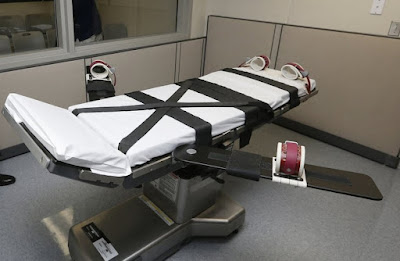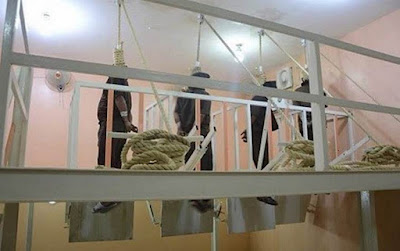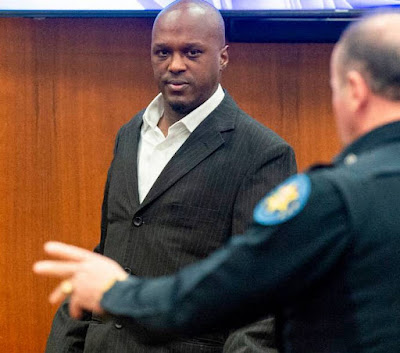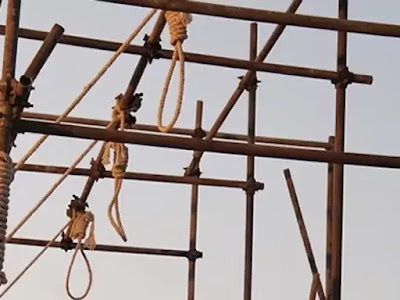It has been 12 years since Pennsylvania executed a convicted killer, but in that time, death row has still cost taxpayers more than $27 million.
Every year, the state Department of Corrections spends an estimated $10,000 more for each inmate on the country's fourth largest death row compared to other prisoners. That's despite a de facto halt on capital punishment in Pennsylvania for all but prisoners who voluntarily go to their executions. The last person put to death against his will was in 1962, half a century ago.
The most recent to be executed, in 1999, was Philadelphia torture-murderer Gary Heidnik — and only because he bowed to it by waiving his appeals. Since then, the state has housed on average 227 inmates a year facing death sentences, for an additional cost of $27.24 million, or $2.27 million annually. And this when executions have ceased.
The numbers, provided after a request by The Morning Call, offer a peek into the expense of a system in which a death row prisoner is far more likely to die of old age or illness than by lethal injection. They represent the added security costs involved with isolating the inmates in prison. But they are just a fraction of capital punishment's total cost for taxpayers, given the staggering legal bills also tied to putting someone to death.
The accounting comes as unsteady finances have rocked Pennsylvania and local governments, causing layoffs and cuts to services that have affected everything from safety-net programs for the poor to public schools and higher education. The Department of Corrections' budget, at $1.86 billion, remained flat this year.
The death penalty hasn't been part of the budget debate, though some lawmakers say it should be looked at considering the lack of executions. Other states have reconsidered capital punishment in part over its expense, including New Jersey, New Mexico and Illinois, which have repealed the death penalty in the past 4 years.
For death-penalty opponents, the price tag underscores how much society spends in the unreasonable expectation of exacting the ultimate punishment. For supporters, it shows how a runaway appeal process has kept murderers from their deserved fates, thwarting the will of juries and state lawmakers.
"There's either going to be a retreat on the death penalty, or an effort to put more of these people to death, depending on the political will," said Northampton County District Attorney John Morganelli, a Democrat who is a vocal backer of capital punishment. "Something's got to give."
Morganelli blames delays in imposing death sentences on the federal appeals process, which he calls a "frustrating system." There, cases affirmed by the state courts get scrutinized and often reversed. He says it may take turnover on the federal bench for executions to start again.
Inmates on death row "should have been gone a long time ago, and it wouldn't be costing the state all this money," Morganelli said.
Marc Bookman, a former public defender who runs the nonprofit Atlantic Center for Capital Representation in Philadelphia, which advises capital defense teams, dubs Pennsylvania's death penalty "the biggest waste of money imaginable," draining away funds that could be better spent on more police officers, improving education or building playgrounds and keeping libraries open. He thinks the state should eliminate the cost completely by repealing the death penalty.
"We cannot continue to spend this absurd amount of money and waste these incredible resources just so that some politician can be tough on crime," Bookman said. The death penalty "can't be justified."
Pennsylvania's modern capital punishment statute dates to 1978, after earlier laws were struck down as unconstitutional in the 1970s. Under it, the death penalty can be imposed by a jury in cases of first-degree murder with at least one aggravating circumstance, such as multiple victims, or the killing of a child or a police officer. The alternative is life in prison without parole.
About 215 state inmates face death sentences today, including five from Lehigh County, one from Northampton and 27 from the region's six neighboring counties. Among them are some of the Lehigh Valley's most notorious, including Allentown serial killer Harvey Robinson? and Michael Eric Ballard, who stabbed to death four people in Northampton last year while on parole for a 1991 murder.
Death row inmates are held in 3 prisons: Greene and Graterford for men, and Muncy for women. They are isolated in separate cells, in the most restrictive conditions the prison system has. For 2 hours a day they are let out for exercise — but alone in a cage.
The heightened security, to protect guards and other inmates, is labor intensive and pushes up costs, said state corrections spokeswoman Susan McNaughton. The inmates require additional staff whenever they are escorted out of their cells, or when they are transported outside of prison for court. The conditions follow the industry standard for death rows in the United States, she added.
The Department of Corrections says it costs $33,000 a year for the average prisoner; with death row, the number reaches $43,000.
The inmates get televisions, radios and reading materials. They can have one non-contact visitor for one hour a week, and one 15-minute phone call. Beyond dealings with staff, human interaction is sparse: They communicate with other inmates by yelling from their cells or "fishing" by tying a note to the end of a string and flinging it to neighboring cells.
By comparison, an inmate serving a life sentence is housed in the prison's general population, where restrictions are raised or lowered based on his or her behavior. There, prisoners usually have a cellmate and can be bunked with as many as seven others in dorm-style units. They spend most of their time outside their cells, and are required to work, attend classes or volunteer, McNaughton said.
Death row "just requires the strictest of housing available," McNaughton said. "It goes back to the fact they are the most maximum security level we have."
Given the breadth of the appeal process, the average death row prisoner has been there 141/2 years. The longest serving is Mumia Abu-Jamal, under a capital sentence for nearly 28 years for the 1981 murder of a Philadelphia policeman. His legal saga continues, with a federal court in April ordering a new sentencing hearing after finding the instructions given his original jury were unclear.
The length and contentiousness of appeals has critics who include the chief justice of the state Supreme Court, Ronald Castille?. In a blistering opinion in April, Castille assailed tactics by defense attorneys that he said aimed to "obstruct capital punishment in Pennsylvania at all costs."
Castille noted that Pennsylvania, 33 other states and the federal government all have the death penalty, whether opponents "like it or not."
Defense attorneys for capital cases note that many inmates slated to die have seen their sentences overturned at appeal. That includes 6 men in Pennsylvania who were eventually exonerated, according to the Death Penalty Information Center, a nonprofit national clearinghouse.
Since 1983, another 115 death row inmates have been resentenced to life in prison without parole after appeals. And 12 more wound up with even lesser sentences, statistics kept by the state Department of Corrections show.
In that time, 29 inmates on death row died — 23 from natural causes, 3 from suicide, and 3 by execution after they voluntarily abandoned legal challenges to their sentences.
Some Pennsylvania legislators are questioning whether the death penalty is working as intended. And before he left office in January this year, Gov. Ed Rendell, a death penalty supporter and a former Philadelphia district attorney, said that if executions cannot be streamlined, the state should consider whether capital punishment should be repealed.
A "15-, 20-, or 25-year lapse between imposition of a death sentence and the actual execution is no deterrent," the Democrat wrote legislators. "In the public's eye, the crime and the victim may be long forgotten. To criminals on the street, our death penalty is simply not a reality."
State Sen. Stewart Greenleaf, R-Montgomery, has proposed a bill to study the death penalty to determine its cost, its deterrent effect, and whether it is being instituted fairly and only against the guilty.
"We have to look at this issue," said Greenleaf, chairman of the Senate Judiciary Committee, who has supported capital punishment. "It's a serious issue now whether we should maintain it or not. But we have to have all the facts."
State Rep. Ron Marsico, R-Dauphin, the head of the House Judiciary Committee, said he intends to hold hearings next fall or winter on ways the appeals process could be shortened to speed up executions.
"They appeal, appeal, appeal, and that certainly has driven up the cost for state taxpayers," Marsico said.
Studies in other states have shown capital punishment's price — even in corrections alone — to be higher than the Pennsylvania prison system's estimate. In New Jersey, which abolished the death penalty in 2007, a state commission estimated each death row inmate cost $72,602 a year, almost $32,000 more than someone serving a life sentence.
In California, which has the country's largest death row, the per-inmate cost was tabulated at an additional $90,000 a year, according to a 2008 state commission. With 714 prisoners, that's more than $64 million annually.
Ron McAndrew, a former warden at Florida State Prison who oversaw executions but now opposes them, said he is skeptical of any estimate of the death penalty's cost. Just taking a death row prisoner to the shower or to his daily exercise requires enormous manpower, he said.
"It takes a lot of money out of the taxpayers' pocket," McAndrew said.
In many states, questions about costs have helped reignite capital punishment discussions, said Richard Dieter, executive director of the Death Penalty Information Center.
"If there is nothing coming out in terms of return, it is an issue for policy makers and budget cutters," Dieter said. "It's not putting a price on justice, but figuring whether people are getting what they want for their dollars."
Dieter added that cost hasn't been the deciding factor in legislative debates, however, with votes ultimately still resting on bigger picture questions like the morality of capital punishment and whether the innocent are being put to death.
Even the attorney for Heidnik, the last man executed in Pennsylvania, said at trial that he was "very, very guilty," even as he argued that Heidnik — who imprisoned 6 women in his dungeon-like basement and murdered 2 of them — was insane.
Heidnik's July 6, 1999, execution was the first and only conducted in the state's then-new execution complex, a former field hospital that was opened 2 years earlier on the grounds of Rockview State Prison .
It cost taxpayers $118,539 to turn the building into a maximum security center with new cells, secure phones and an electronic monitoring system — a price kept down by the use of prison labor, according to the state Department of General Services.
In 2007, the complex needed a new roof and got one for $44,190 — eight years after the state's last execution.
Source: Associated Press, July 28, 2011
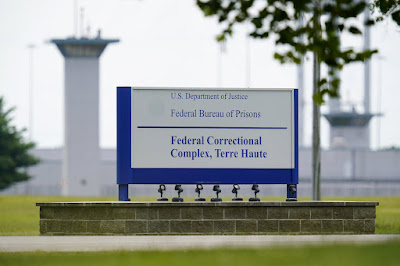

.jpg)

